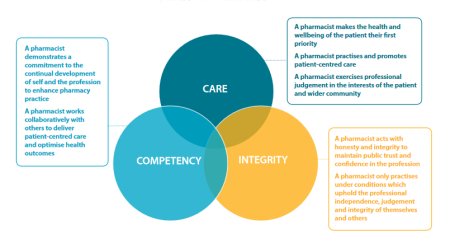Despite having a code of ethics, pharmacists are becoming more invasive in patient privacy, causing discomfort and embarrassment, writes Sophia Irvine.
FROM FEBRUARY 2018, any medicine containing codeine was banned from being sold over the counter.
Fine, the Government thought we were heading towards an opioid epidemic similar to readily available hillbilly heroin in the United States and acted accordingly.
We can deal with that; females can take their monthly period pain elsewhere. Naprogesic can help, so can screaming at any poor soul who comes your way.
Plus, if you are taking codeine, you should be – or already are – seeing a doctor as there is most likely a medical reason as to why you are taking the medication in the first place.
There was very little backlash and it's understandable as to why a government might want to avoid an addicted population. When you live in Australia, you get used to rules which seem weirdly strict and unnecessary.
Did it help the nation medically? It's hard to tell. Is cocaine easier to obtain than any downer? That's a hard and firm yes.
So, codeine is off the market and only available via a doctor, who writes you a prescription, a brief description of why you are on the medication, which you take to the pharmacy and Bob's your uncle, right? Wrong.
What proceeds is a two to five minute (depending on the medication) question and answer session, consisting of why you are on the medication and have you taken it before, and did you know it's addictive?
It's stated on the prescription why you're on the medication and the two other questions have obviously been answered and explained by the doctor — unless your practitioner is Dr Seuss. So, doctors aren't trustworthy now and the chemist is the moral compass of our health.
Consult your local pharmacist for further questions. No, thank you, we spend an unfair amount of time and money to go to the doctor to have all these questions asked and then all our questions answered.
One person was questioned by the pharmacist as to why they had changed antidepressants, why the dose had increased and if they were taking the recommended amount.
Mental health is difficult to talk about, even with those you pay to help you. It feels invasive having to explain mental conditions to your pharmacist when the job has already been done with the doctor who changed the medication and dose. Also, no one takes antidepressants for fun. If you are on them, you most likely don't want to be but you take them because you want to get better, not worse.
In another example, someone with arthritis was prescribed a painkiller. To be fair, the arthritis wasn't stated on the prescription, it just said “back pain”. However, we've established the doctor is aware of the condition, hence the prescription.
The dispensing pharmacist asked, “How's your back?” It would take you off guard when someone you have never met asks you a question about your health; you forget they have that little piece of paper with your medical issues on it.
“Fine, thank you, with the medication. Without, not so good,” answered the customer. Reasonable, right? Question answered, thank you for caring, may I please leave now?
“Have you tried hydrotherapy?” Shocked, not offended, the customer replied: “No, it's arthritis.”
The medication was handed over pretty quickly after that and the pharmacist faded into the abyss, probably Googling if arthritis can be treated by hydrotherapy.
And finally, a patient looking to treat ulcers in her mouth had been to the dentist, who told her to go to the pharmacy and ask for a specific over-the-counter treatment.
At the pharmacy, the person requests the medicine and the chemist says: “Open your mouth.” Excuse me? Mouth ulcers aren't the most attractive condition to have. Plus, it's embarrassing opening your mouth even for your dentist, let alone opening your mouth for your chemist in a pharmacy full of other patrons.
According to the Pharmaceutical Society of Australia, pharmacists are supposed to follow a code of ethics — the latest version of which was released in 2017.
The three main components of this code are 'care, integrity and competency'.

The pharmacist has always been the in-between person, tasked with the job to double-check the patient is aware of what they are taking, why and for how long.
It is a part of their job and Australians respect that.
However, with codeine out of the pharmacist's hands and placed safely within a doctor's prescription pad, have our chemists taken this code of ethics to a whole new level to ensure they are doing their part in keeping Australians away from addictive medication? Even though their power has been lessened in the issuing of addicting medication, their questions and involvement in the act of handling this and other medication have increased.
Do they and the Government not trust our doctors? Or do they feel the need to insert themselves in medical situations to which they are no longer privy? Or, are they on a power trip because donning that white coat means no patient will be allowed to receive the medicine they have been prescribed without being thoroughly quizzed and a little embarrassed?
At this rate, it's possible by 2030 we will be asked to provide a blood sample in order to obtain tampons, a written and signed doctor's certificate that we are sexually active so we are allowed condoms and stool samples in order to get laxatives, since they, too, are addictive.
*DISCLAIMER* This article's image has been amended. The original image of a pharmacist was accidental and in no way intended to allege that the pharmacist pictured engaged in any unethical behaviour. We apologise unreservedly if any such inference was drawn.
Sophia Irvine is a freelance writer, residing in Sydney Australia.
 This work is licensed under a Creative Commons Attribution-NonCommercial-NoDerivs 3.0 Australia License
This work is licensed under a Creative Commons Attribution-NonCommercial-NoDerivs 3.0 Australia License
Support independent journalism Subscribe to IA.












